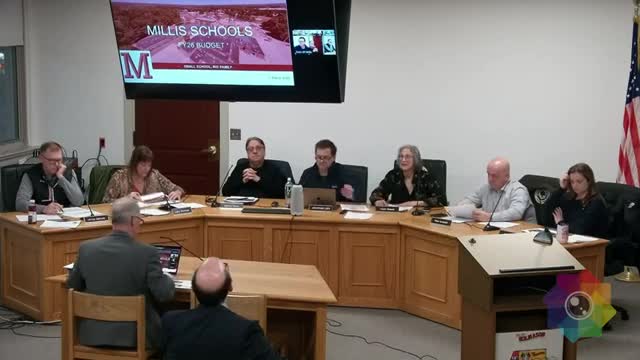Millis school leaders present FY26 budget request as enrollment and special‑needs counts rise
Get AI-powered insights, summaries, and transcripts
Subscribe
Summary
Superintendent Bob Malaney told the Millis Finance Committee on March 19 that the school department’s FY26 spending request is above the town’s 4% target because declining grants and choice receipts mean the district must absorb roughly $480,000 of previously offset salaries and because special-education and contracted-service costs are rising.
Superintendent Bob Malaney presented the Millis Public Schools’ proposed FY26 budget to the Millis Finance Committee on March 19, telling the committee the district’s request is higher than the town’s 4% target because several grant and revolving-fund offsets have expired or declined.
Malaney said enrollment across the district is largely flat compared with last year, at about 1,183 students, but the district has seen a substantial rise in students identified as ‘‘high needs’’ (English learners, low‑income students, and students with disabilities). He said students with disabilities now represent about 20.9% of the district — up from roughly 12.2% a decade ago — and that many of the students who moved into the district since October require special-education services included in their IEPs. When students arrive with IEPs the receiving district is legally required to provide the services in those plans, Malaney said.
Malaney and school committee members described several budget drivers:
- Special education: both in-district services and out-of-district tuitions (the district recorded fewer out-of-district tuitions this year, reducing that line by about $300,000 compared with last year, but overall special-education costs remain the largest driver of increased spending). The district uses the Massachusetts ‘‘circuit breaker’’ reimbursement to offset some out-of-district tuition costs.
- Contracted services: shortage of specialized staff (for example registered behavior technicians), van drivers and other positions has forced the district to contract services at higher cost, the superintendent said.
- Declines in offsetting revenue: revenues from school choice, certain grants (for example a grant that helped fund a special-education teacher and an EL teacher), and other revolving funds have fallen — Malaney said Choice receipts fell from $356,000 in FY25 to a projected $244,000 for FY26 — shifting roughly $480,000 in salaries from grant/revolving funds to the operating budget.
- Transportation and capital technology: bus leases, van purchases, and device replacement cycles are recurring, material expenses.
Malaney presented the district’s FY26 request as a total budget figure and itemized components; he explained that the request as presented exceeded a 4% target by roughly $330,000, a shortfall that would require program or staff reductions if not covered by the town. He repeatedly stressed that further cuts would likely require staff reductions or reductions to services the district considers essential.
Committee members asked for more detail on several points, including the per‑student cost of IEPs, the district’s use of choice revenue, the potential enrollment impacts of Tri‑County Regional Vocational Technical High School’s new building, class size effects from prior staff cuts (Malaney noted Clyde Brown Elementary is already over its design enrollment and contains larger-than-desired classes), and whether preschool and kindergarten tuition covers program costs (school committee member Mark Conroy said tuition does not fully cover costs when IEP-related services are present).
Malaney said the district will present a balanced budget at Town Meeting in May and a recast (final) budget in June after town meeting actions and after contract negotiations conclude; he also said the district is continuing to assume federal entitlement grants will remain roughly at current levels rather than grow.
Ending: The Finance Committee heard the presentation, asked clarifying questions, and requested additional breakdowns (for example a more granular district‑wide expense list and details on the transportation and central services slices). The committee voted separately to authorize its chair to send a letter to state legislators about Chapter 70 funding; the school budget itself was not voted on at this meeting.
